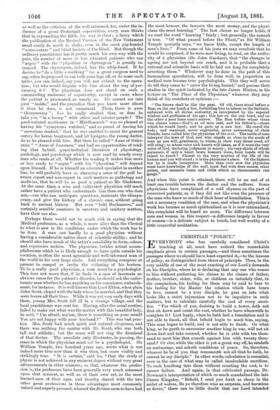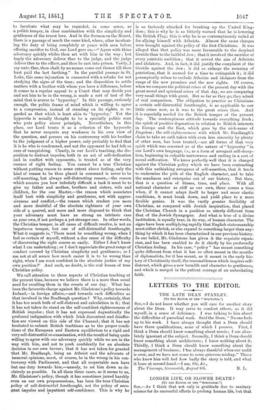CHRISTIAN "POLICY."
EVERYBODY who has carefully considered Christ's teaching at all, must have noticed the remarkable emphasis given in certain passages,—and these sometimes the passages where we should have least expected it,—to the lessons of policy, as distinguished from those of principle. Thus, in the very middle of one of the most exacting of our Lord's demands on his Disciples, where he is declaring that any one who comes to him without preferring his claims to the claims of father, mother, brother, sister, wife, or children so infinitely that, in the comparison, his feeling for them may be said to bear to his feeling for the Master the relation which hate bears to love, cannot be a true disciple, he goes on into what looks like a strict injunction not to be impulsive in such matters, but to calculate carefully the cost of every sacri- fice. "For which of you, desiring to build a tower, doth not first sit down and count the cost, whether he have wherewith to complete it P Lest haply, when he hath laid a foundation and is not able to finish, all that behold begin to mock him, saying, This man began to build, and is not able to finish. Or what king, as he goeth to encounter another king in war, will not sit down first and take counsel, whether he is able with ten thou- sand to meet him that cometh against him with twenty thou- sand ? Or else, while the other is yet a great way off, he sendeth an anabassa.ge, and asketh conditions of peace. So, therefore, whoever he be of you that renounceth not all that he hath, he cannot be my disciple." In other words, calculation is essential, even in the case of what may be called incalculable sacrifices. To rush headlong into them without counting the cost, is to ensure failure. And again, in that celebrated passage, Dr. Newman's interpretation of which so much scandalised the late Canon Kingsley, "Behold, I send you forth as sheep in the midst of wolves, Be ye therefore wise as serpents, and harmless as doves," there can be little doubt that our Lord intended
to inculcate what may be regarded, in some sense, as a politic temper, in close combination with the simplicity and gentleness of the truest love. And in the Sermon on the Mount, there is a passage of much the same kind, where, after inculcat- ing the duty of being completely at peace with men before offering sacrifice to God, our Lord goes on,—" Agree with thine adversary quickly whiles thou art with him in the way ; lest haply the adversary deliver thee to the judge, and the judge deliver thee to the officer, and thou be cast into prison. Verily, I say unto thee, thou shalt by no means come out thence till thou bast paid the last farthing." In the parallel passage in St. Luke, this same injunction is connected with a rebuke for not studying the signs of the time ; and the disposition to settle matters with a brother with whom you have a difference, before it comes to a regular appeal to a Court that may decide you and not him to be in the wrong, is made a sort of test of the mind that is averse to hypocrisy.' In this passage, curiously enough, the politic frame of mind which is willing to agree to a compromise, instead of standing on its rights, is re- garded as that which is least akin to hypocrisy.' Yet the hypocrite is usually thought to be a specially politic man
who puts policy above principle, Nevertheless, in this place, our Lord treats it as a criterion of the hypocrite -that he never suspects any weakness in his own view of the question, and presses on his controversy with his brother to the judgment of a higher power, only probably to find that it is he who is condemned, and not the opponent he had felt so .sure of vanquishing. Clearly, in our Lord's teaching, the dis- position to distrust impulse, both in an act of self-dedication and in conflict with opponents, is treated as of the very • own position ?' And such, no doubt, is the real lesson of true 'Christian policy. We call attention to these aspects of Christian teaching at -the present time, because we believe there is a more than usual need for recalling them in the events of our day. What has been the favourite charge against Mr. Gladstone's policy towards Ireland,—in foreign affairs,—and towards such difficulties as -that involved in the Bradlaugh question? Why, certainly, that it has too much both of self-distrust and calculation in it ; that it has not taken its stand on the self-confident righteousness of British impulse ; that it has not expressed dogmatically the profound indignation with which Irish discontent and disaffec- tion are viewed on this side of the Channel; that it has not hesitated to submit British traditions as to the proper condi- tions of the European and Eastern equilibrium to a rigid and -very self-distrustful re-examination, with the result of being quite willing to agree with our adversary quickly while we are in the way with him, and not to push confidently for an absolute -decision in our own favour; that it has not taken for granted -that Mr. BracIlaugh, being an Atheist and the advocate of immoral opinions, must, of course, be in the wrong in his con- troversy with Parliament, and that all respectable men have but one duty towards him,—namely, to set him down as de- ,cisively as possible. In all these three cases, as it seems to us, Mr. Gladstone's policy, though it has sometimes jarred harshly -even on our own prepossessions, has been the true Christian policy of self-distrustful forethought, not the policy of arro- gant impulse and impatient self-confidence. This is why he is so furiously attacked for breaking up the United King- dom ; this is why he is so bitterly warned that he is lowering the British Flag ; this is why he is so contemptuously railed at for allying himself with Atheists. Almost the same charges were brought against the policy of the first Christians. It was alleged that that policy was more favourable to the despised Gentile than to the faithful Jew ; that it involved the sacrifice of every patriotic ambition ; that it served the aim of Atheists and idolators. And, in fact, it did justify the complaint of the Gentile against the Jew ; it did so enlarge the meaning of patriotism, that it seemed for a time to extinguish it ; it did peremptorily refuse to exclude Atheists and idolators from the range of the new promises and the new rights. Of course, when we compare the political crises of the present day with the great moral and spiritual crises of that day, we are comparing very small things with great. But so far as they go, they admit of real comparison. The obligation to practise as Christians a certain self-distrustful forethought, is as applicable to our little crises now, as it was to the great crises then. And it is especially needed for the British temper of the present day. The contemptuous attitude towards everything Irish ; the spirit of positive dogmatism in relation to British interests in Europe and the East, which goes by the nick-name of Jingoism ; the self-righteousness with which Mr. Bradlaugh's claim to take an oath taken with even less sincerity by plenty of other men, has been treated,—are all forms of that very spirit which was censured as of the nature of" hypocrisy "in our Lord's own language, i.e., as a form of arrogant self-decep- tion, beginning in culpable narrowness and ending in a sort of moral suffocation. We know perfectly well that it is charged against the Christian policy which we have been contrasting with this unthinking arrogance of self-assertion, that it tends to undermine the pith of the English character, and to take the manliness and enterprise out of our history. But then, that is a question of fitness, time, and place. With all national character as stiff as our own, there comes a time when, if it cannot adapt itself to larger and more elastic conditions, it must break down, and yield place to a more flexible genius. It was the vastly greater flexibility of Christian, as compared with Jewish inspiration, that placed the Christian Church in a position so utterly different from that of the Jewish Synagogue. And what is true of a divine institution, is equally true, in its way, of human character. The signs have been multiplying rapidly that English statesmanship must either shrink, or else expand to something larger than any- thing by which it has been characterised in our previous history. In our belief, Mr. Gladstone has given it the requisite expan- sion, and has been enabled to do it chiefly by his profoundly Christian feeling. In his case, " policy " has meant something quite different from what it has so often meant in the mouths of diplomatists, for it has meant, as it meant in the early his- tory of Christianity itself, the reasonableness which inspires self- distrust, which gives a new breadth and character to gentleness, and which is merged in the patient courage of an unhesitating faith.































 Previous page
Previous page